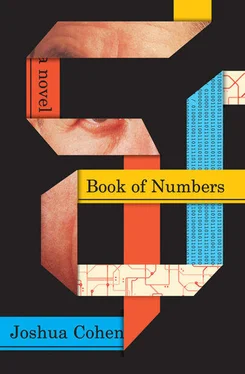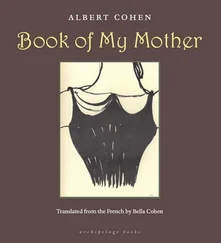Because sitting next to him was Rach.
\
I started fabricating immediately — as if I were Rach — began peddling their presence to myself: this was just a routine appointment enlivened with nature. A meeting negotiated into a harmless park outing. Their commercial was about to be shot, had been shot and was about to air. This was crunchtime, kinks had to be smoothed, geriatric touches retouched.
I remember thinking that their conversation — this situation — was itself a commercial, an infomercial, a public service announcement warning: you’re not as witty as you think.
The actor noticed me before she did, and he recognized too — two stars in rare midday conjunction. His face tanned a shade deeper, and went rumpled as if by a gust, like the dewed pollenstrewn picnic blanket — a bedsheet, one of ours.
Rach collapsed into her lap.
She’d been complaining about him since the fall. He’d been forced on her by a director, by an agency exec. She’d never been more harried on set, she’d never dealt with talent more demanding. So old, hard of hearing, glaucomic, goutish — just getting his travel arranged was an account in itself, a nightmare.
But the way Rach kept her head in her hands told me the truth: that he’d been her true campaign, or she his, all along, and that all her whining to me had just been a prompt or cue — to be something, to change something, perform my regret, make amends.
What’s my line? Did I have any lines?
Otherwise, his presence would’ve been nothing but scenery to me — he’d existed strictly in bitparts, never as a whole. Until then, I’d thought of him only as a supporter, a walking dead rerun, I’d known him only as a man who — a generation after appearing as the first teacher cannibalized by student zombies in the last installment of a horror franchise, as the smilingly wisenheimer outtaboro accent of an animated knishcart in a popular afterschool cartoon series — didn’t even work with my wife, but worked for her.
A face without a voice, a voice without a face, though even if both were retained, I couldn’t remember his name. I hadn’t expected him to feature in my marriage, and, moreover, even if I had, I could never have suspected that the character most natural for me to portray — Jewish Husband #1—would feel guilty about it.
“I’m sorry,” I said, “I’m interrupting.”
Rach raised her head, said, “You’re not,” but too formally, as if our next meeting would be with our lawyers.
“Decided to take the day off?”
“What about you — keeping tabs on me?”
“I had a meeting.”
“We’re having one too,” and she bowed to the actor, who was friendly, or who was trying to be, I’ll give him that — when he held my face with his and said, “You’re the husband.”
Rach, helplessly, laughed, “Take two.”
He repeated, but did so reluctantly, “You’re the husband.”
Rach, out of control, shrieked her teethbleach, “Isn’t that fantastic?”
“Isn’t what fantastic?”
She shrilled, clogstomped, applauded, “You never watched our spot?”
“My apologies,” I said to him, and to her, “I’m sure you never told me to watch it.”
“I did,” she said. “A couple’s like asleep in bed — does that ring a bell?”
My sneaks sunk in the soppy turf, grass engrossing, growing over the heels—“Ringing nothing.”
“Like a couple’s asleep in bed,” she said. “At least they’re presented like a couple in bed, in the suburbs — when suddenly an alarm sounds loud from downstairs, it wakes them up and the woman whispers it must be a burglar, like get up, like go downstairs and be a man — you’re positive I never showed you?”
“About the only thing I’m positive about.”
I was honestly ignorant, yet I loathed her describing ads to me, her scolding me for having to describe them.
“So the guy steps out like with a baseball bat on tiptoe, only to meet like a stranger prowling around the den and shouting who are you and the guy’s screaming who are you and like he’s got the bat cocked and is about to take a swing but like hesitates just perfectly because the stranger, the alleged burglar who’s all balled in the corner, he whimpers?”
“I’m the husband,” the actor gave an imitation whimper.
“That’s who you are?” I said. “You’re the husband?”
“The other guy,” Rach said. “It’s our spot for Skilling Security.”
\
I’ve since rectified, viewed it online:
After that line the camera pans disinterest across the cozy den, taking in a row of photos of the wife from upstairs alongside the second man, the supposed burglar, plowing the ski slopes, hippie fab at their wedding, babyboomed flabby on an anniversary cruise.
After a cut to the logo of Skilling Security like a coat of arms with a Yield sign, the ad cuts again to EMTs, fire, two burly cops cuffing the adulterer.
A final tense shot of husband and wife, confronted by infidelity, cozened by den and moon.
The commercial’s wife, the actress, appears to be younger than Adam but older than Rach, who cast her, I’m sure, so as not to attract him or be threatened herself. Or just so the relationship would test appropriate agewise. As for the husband, he’s not my type, but not Rach’s either. She had the egalitarian audacity to cast a Vietnamese, who’s ageless.
But it’s Adam who has the last word, in custody overdub, police cruiser voiceover, though now I can’t recall what it was, rather I can’t differentiate it from the last words of his other commercials I clicked on (for razors, deodorants, cholesterol meds), nor can I recall him, for that matter, in any of the made for TV dramedies, or the direct to video aliens vs. robots action thrillers I torrented (always portraying the reliable neighbor in the former, and a rabbi in the latter), as having been wardrobed or madeup at all differently than he was just then, a gentle goof in suede, an endearing streak of sunblock down the nose stump.
“I’m Adam,” he said, finally rolling the credits.
His sitting height was my standing height. His hand was damp, but the body behind it was muscle.
“No doubt,” I said, “Rach’s told me everything about you.”
“You might as well join us.”
“Already?” Rach said.
I said, “Since the weather’s so nice.”
“It is,” Adam patted a slat.
Rach said, “Already?”
Adam said, “A pleasure.”
“I’d love to,” I said, “but I have writing to do.”
Rach said, “No doubt”—like she was flinging a crust, as I hurried off for Ridgewood.
Cut.
One last repeat, one last syndication:
Another man’s career is revived, only because of his relationship with my wife, and I’m supposed to take that as material. A suggestion for Adam’s next vehicle: an adaptation of Rach’s life, in which I play him and he plays me.
How am I, a writer, supposed to feel about having lost you to a reader? Not even — a memorizer?
What to say, Rach? Will you tell me what to say?
://
May through to June I spent my time deciding how to spend my time, which is the first, second, and third through nine thousand seven hundred and griftyfifth items on the agenda of every writer, or neurotic. I was getting ahead of myself, fretting whether the book would have to have notes or sources cited, fretting whether I’d be allowed to decide anything at all.
Meanwhile, the sweater layers came off and then the women put on shorts and then the men put on shorts and everyone became a child. The applianceries threw up bunting declaring preseason priceslashes on BBQs and ACs, and all the children were out on Atlantic Avenue slurping challenging snowcones in flavors like tripe.
Читать дальше












